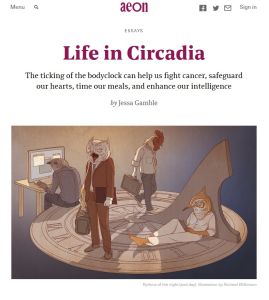Join getAbstract to access the summary!

Join getAbstract to access the summary!
Jessa Gamble
Life in Circadia
The Ticking of the Bodyclock Can Help Us Fight Cancer, Safeguard Our Hearts, Time Our Meals, and Enhance Our Intelligence
Aeon, 2016
What's inside?
Doctors are harnessing our circadian rhythms to deliver treatment at the right time, with outstanding results.
Recommendation
Circadian rhythms – the 24-hour cycle all living beings run on – influence not only when you sleep, but how every system in your body functions, including metabolism, cell regeneration and immune response. Science writer Jessa Gamble explains how artificial light, international travel and late-night snacks could negatively affect your daily cycle. The good news is that doctors are learning how to monitor individual rhythms and deliver medical treatments at the correct time to maximize effectiveness and minimize side-effects. getAbstract recommends Gamble’s article to anyone curious about the workings of the human body.
Summary
About the Author
Science writer Jessa Gamble co-owns the Last Word On Nothing blog. Her latest book is The Siesta and the Midnight Sun: How We Measure and Experience Time.

















Comment on this summary